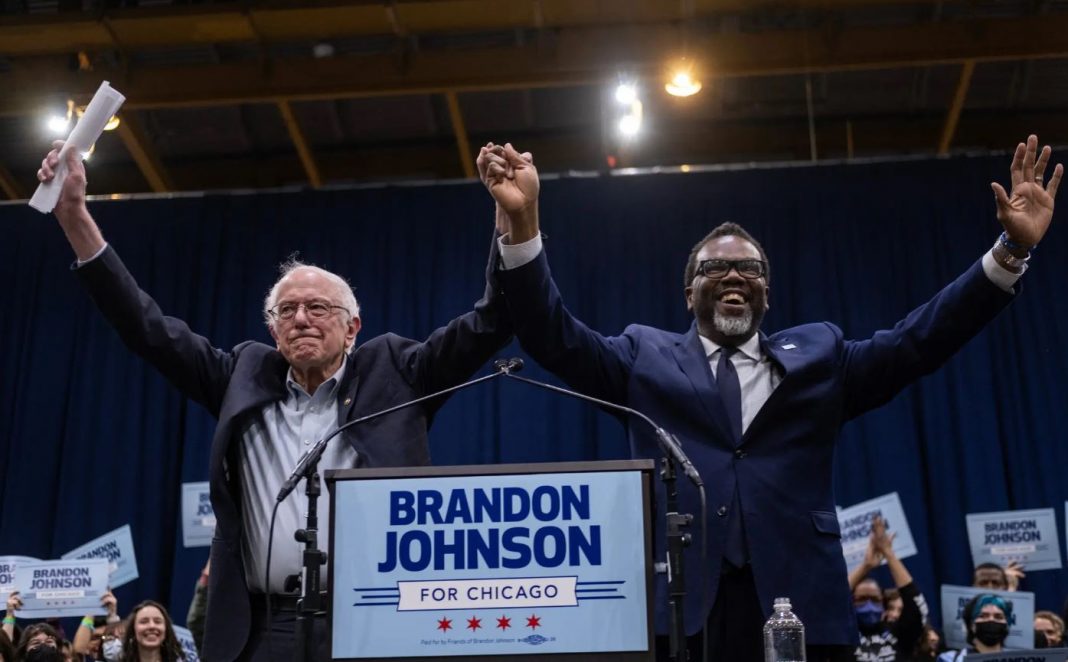Brandon Johnson was running for mayor of Chicago, and in the latter days of the race, he held a joyous celebration at which Senator Bernie Sanders, who had backed Johnson, spoke in front of more than 4,000 supporters. He travelled all over the South Side and West Side, stopping at six different churches on just one Sunday. On the day of the election, an army of volunteers working for Mr. Johnson went door-to-door throughout the city, knocking on 46,000 homes to generate excitement and encourage late voters to cast their ballots.
Young people, black voters on the South and West Sides, a sizeable number of Latino voters, and white progressives on the North Side and along the lakefront were coming together to form the coalition that Mr. Johnson need in order to win the election.
Paul Vallas, a more conservative Democrat and a former school administrator, started the runoff race with a substantially wider base of support than Mr. Johnson, a Democratic county commissioner who was unknown to many Chicagoans a few months ago. On Tuesday, Mr. Johnson, who came from behind to beat Mr. Vallas, defeated Paul Vallas. Mr. Vallas, who is 69 years old, was the preferred candidate of many moderate and conservative voters. He campaigned on a law-and-order platform, in which he vowed to increase the size of the police force and clamp down on criminal activity.
In spite of the fact that a significant number of Chicago residents responded to surveys indicating that they saw the problem of public safety as being the most important issue in the election, Mr. Johnson, 47, was the candidate who won a majority of the votes cast on Tuesday. He tapped into the extensive network of progressive groups in Chicago’s liberal neighborhoods, which concentrated on field work to mobilise voters. These groups ranged from the influential Chicago Teachers Union to more modest ward-based political organisations. Mr. Johnson attempted to persuade people to embrace a public safety strategy that extended beyond police, while at the same time distancing himself from his prior support for the defunding of law enforcement.
Since the airing of a television interview from 2009 in which Mr. Vallas described himself as “more of a Republican than a Democrat,” Mr. Johnson was able to capitalise on widespread concerns among Democratic voters over Mr. Vallas’s affiliation with their party. This was made possible by the fact that Mr. Johnson ran against Mr. Vallas.
And Mr. Johnson made the most of important endorsements to strengthen his credibility among people who did not know him very well, notably those from Senator Sanders and Representative Jes G. Garca, a progressive congressman whose base of support is in mostly Hispanic neighbourhoods on the West Side. Both of these politicians endorsed Mr. Johnson.
Nevertheless, Mr. Johnson will assume leadership of a Chicago that is badly fractured. Despite the fact that thousands of mail-in votes are yet to be tallied, Mr. Vallas, who was once in charge of the city’s public school system, earned roughly 49 percent of the vote to Mr. Johnson’s 51 percent. The majority of voters cast their ballots for Mr. Vallas during the first round of voting in February.
Just as he did in the first round of voting back in February, Mr. Johnson did well in some neighbourhoods that are mainly white along Lake Michigan and in those neighbourhoods that are predominantly Hispanic northwest of downtown. On the other hand, Mr. Johnson, who is black, triumphed on Tuesday in wards with Black majorities, capturing 80 percent of the vote in some of those regions on the South and West Sides. This is in contrast to what happened back then.
Mr. Johnson was in the lead with more than 80 percent of the vote on one of the Far South Side wards that Ms. Lightfoot had won by a significant margin in February. Mr. Johnson was able to win over voters thanks to church visits, union endorsements, and the backing of neighbourhood organizations, according to Ronnie Mosley, a progressive Democrat who was ahead in the campaign for that ward’s seat on the City Council. Mosley claimed that Mr. Johnson had been able to win over people.
According to Paul Rosenfeld, progressives in his North Side ward divided their votes between Mr. Johnson and Mr. Garca before the first round of voting. Mr. Garca ultimately ended in fourth place. However, before to the runoff, Mr. Rosenfeld, the Democratic Party committee member in his ward, said that liberal voters had gathered around Mr. Johnson, with canvassers from United Working Families and labour organisations going on a door-knocking blitz. Mr. Rosenfeld was speaking before the runoff.
According to Tom Bowen, a Democratic strategist who worked for Rahm Emanuel and for Ms. Lightfoot, Mr. Johnson’s success may be attributed, in large part, to his ability to appeal to liberals who see themselves as being most closely aligned with the Democratic Party.

